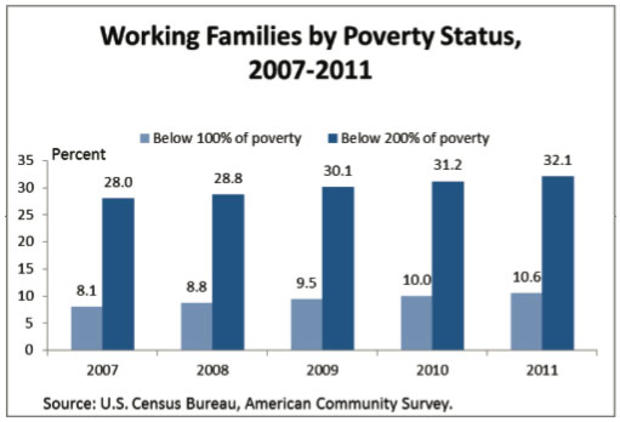U.S. economic recovery leaving families behind
(Moneywatch) Although more Americans have found work in recent months, many of these jobs pay less than they did before the 2008 financial meltdown. The result: An increase in the number of families near or below the poverty line despite at least one parent having a job, according to a report released Tuesday.
More than 70 percent of low-income families and half of all poor families were working by 2011, according to The Working Poor Project, a privately funded research initiative aimed at improving economic security for low-income families. Yet 32 percent of working families, defined as a household where one person worked at least 39 weeks in the past 12 months, now qualify as low-income, according to 2011 data from the U.S. Census Bureau's American Community Survey. That figure is up from 28 percent in 2007. More than 1 of 10 working families were below the official poverty line.
Such numbers capture a disturbing reality even as the U.S. economy stabilizes following the greatest financial crisis since the Great Depression: The ongoing "recovery" is leaving behind millions of people.
- Census report doesn't capture extent of poverty
- During recovery most new jobs offer low wages
- Unemployment could plague U.S. after jobs return
A low-income family is one that earns less than $45,000 a year. The official poverty rate for a family of four is $22,811. "Although many people are returning to work, they are often taking jobs with lower wages and less job security, compared with the middle-class jobs they held before the economic downturn," the report authors said. "This means that nearly a third of all working families ... may not have enough money to meet basic needs."
Last year, a report by the Pew Charitable Trust found that lower pay has caused the median income of American households to fall as much in the two years following the Great Recession, which officially ended in June 2009, as it had during the recession itself.
Parents in working poor families generally lack the educational credentials, including a college degree, required to get higher paying jobs and have to work in service-sector jobs that require long hours at night and on weekends, according to the Working Poor Project, which is funded by the Annie E. Casey, Ford, Joyce and Kresge foundations.
Approximately 25 percent of low-income parents work in one of eight jobs: cashiers, cooks, health aides, janitors, maids, retail clerks, waiters and waitresses, and drivers, the group found. Cashiers make up the single-largest occupational group, with nearly a million people in low-income working families in 2011.
"However, median hourly wages in these occupations are often not high enough to cover basic household expenses, even for families working full time," according to the report. "Others have seen their jobs disappear altogether, including many carpenters, real estate brokers, painters, secretaries and insurance workers -- leaving them with skills that are needed less in the new economy."
In addition to lower wages, low-income working families faced higher housing costs. In 2012, 61 percent of these households spent more than 33 percent of their income on mortgage or rent payments, utilities and other housing expenses. More than 80 percent of these families below the poverty line had higher housing costs.
Other findings from the report:
- The number of low-income working families in the U.S. increased to 10.4 million in 2011, up from 10.2 million in 2010, and now stands at 47.5 million; nearly half of this number are children.
- 10 U.S. states saw at least a 5 percent jump in the share of low-income working families between 2007 and 2011: Alaska, Arizona, California, Connecticut, Florida, Georgia, Illinois, Michigan, Nevada and South Carolina.
- The richest 20 percent of working families took home 48 percent of all income, nearly 10 times what those in the bottom 20 percent did.
The report throws into question aCensus Bureau study, released last September, that found the number of people living in poverty remained level in 2011, the first time in five years it didn't increase.

